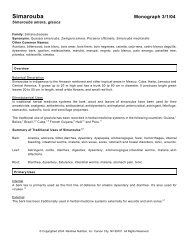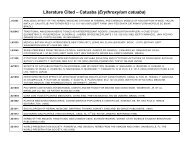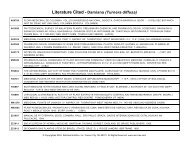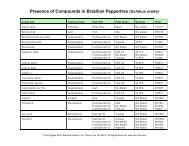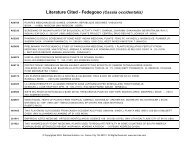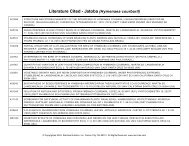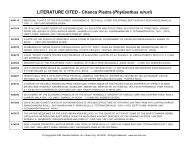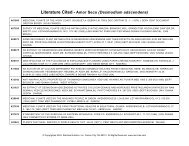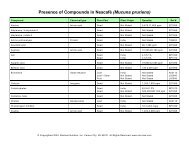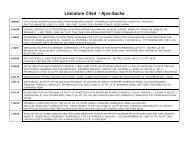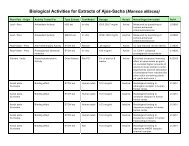Organ Specific Guide - Raintree Nutrition, Inc
Organ Specific Guide - Raintree Nutrition, Inc
Organ Specific Guide - Raintree Nutrition, Inc
Create successful ePaper yourself
Turn your PDF publications into a flip-book with our unique Google optimized e-Paper software.
AMAZON DIGESTION SUPPORT<br />
Description: A synergistic formula of rainforest plants traditionally used in South America as natural<br />
antacids, to support digestive functions, and for stomach ulcers.<br />
Traditional uses by organ or system: Digestive Tract: For digestive disorders (gastric ulcers, Helicobacter<br />
pylori ulcers, gastroenteritis, acid reflux, and ileocecal valve disorders), and to nutritionally support<br />
digestive functions.<br />
Ingredients: A proprietary blend of picão preto (Bidens pilosa), boldo (Peumus boldus), carqueja (Baccharis<br />
genistelloides), jurubeba (Solanum paniculatum), espinheira santa (Maytenus ilicifolia), guacatonga<br />
(Casearia sylvestris) and gervâo (Stachytarpheta jamaicensis).<br />
Suggested Use: Take 2-3 capsules (depending on body weight) with each meal.<br />
Contraindications:<br />
• Not to be used during pregnancy, while breast-feeding or while seeking to become pregnant.<br />
• Several plants in this formula have documented anticoagulant activity or contain naturally-occurring<br />
coumarin. This formula is contraindication for persons with bleeding disorders.<br />
• Several plants in this formula may reduce blood pressure. Those with hypotension should be monitored<br />
more closely for this possible effect.<br />
Drug Interactions: May potentiate anticoagulant and antihypertensive medications.<br />
Other Practitioner Observations and Possible Precautions: Several ingredients in this formula have<br />
demonstrated antacid actions in animal studies and this formula should not be used by persons with low<br />
stomach acid.<br />
Synopsis of research: (Please the online Tropical Plant Database for all cited research.)<br />
• Picão preto has shown in rat studies to protect against chemical- and bacteria-induced gastric lesions<br />
and ulcers and, also, to reduce gastric acid secretion. The activity noted in these studies was higher than<br />
that shown by two prescription anti-ulcer drugs used as controls.<br />
• Boldo has demonstrated in various studies over the years to protect the liver, to stimulate the production<br />
of bile in the liver, as well as to stimulate digestion, increase the secretion of gastric juices and stimulate<br />
the production of bile and its secretion from the gallbladder.<br />
• Carqueja’s antacid, antiulcer, and hypotensive properties were documented in two Brazilian animal<br />
studies in 1992. Its antiulcer and analgesic properties were reported in a 1991 clinical study that showed<br />
that carqueja reduced gastric secretions and had an analgesic effect in rats with Helicobacter pylori<br />
ulcers. That study concluded that carqueja "may relieve gastrointestinal disorders by reducing acid<br />
secretion and gastrointestinal hyperactivity." A later study, in 2000, confirmed its antiulcerogenic effect<br />
when a water extract of carqueja administered to rats protected them from alcohol-induced ulcers.<br />
• Jurubeba has been reported with antiulcer activity. In animal studies it was reported to inhibit gastric acid<br />
secretion induced by stress and various chemical agents, as well as prevented gastric lesions from<br />
developing. Additionally it was reported to inhibit gastric acid secretion in mice with the ulcer-causing<br />
bacteria H. pylori. Researchers summarized, "Collectively, the results validate folk use of Solanum<br />
paniculatum plant to treat gastric disorders."<br />
• Espinheira santa’s antiulcerous abilities were demonstrated in a 1991 study which showed that a simple<br />
hot water extract was as effective as two of the leading antiulcer drugs, ranitidine (Zantac®) and cimetidine<br />
(Tagamet®). In 1997 a Japanese research group filed a patent on the biologically active antiulcer<br />
compounds found in espinheira santa as a new antiulcer drug.<br />
• Guacatonga’s antacid and antiulcerogenic actions have been reported in several animal studies. One<br />
study reported it prevented lab-induced acute gastric mucosal injury equivalent to the antiulcer drug<br />
cimetidine (Tagamet®).<br />
• Gervâo has demonstrated in animal studies to possess antacid, antiulcer, and laxative effects. One study<br />
reported that it increased intestinal motility, protected against ulcers from various chemical agents, and<br />
inhibited gastric secretion.



